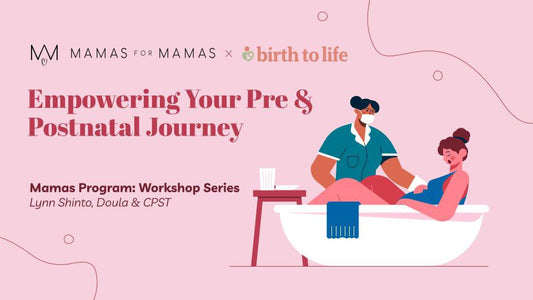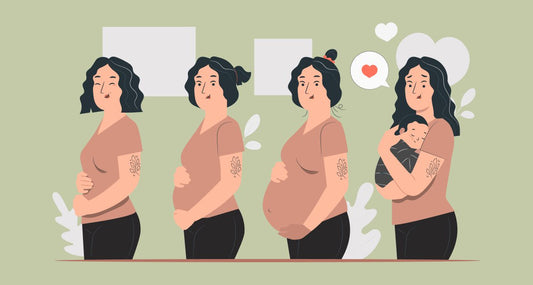What is a doula?
When you hear the word "doula," what comes to mind? Perhaps you picture a soothing presence during labour or someone providing comfort measures. While those elements are certainly part of the doula meaning, there is so much more to it!
A doula is essentially a trained support person who serves as a guide and advocate for new and expectant families, providing emotional, physical, and informational support throughout the pregnancy, childbirth, and postpartum journey. According to a study by the Cochrane Review, having continuous support from a doula during labor can lead to shorter labor times and lower rates of interventions like cesarean sections. That’s not just theory—many families have experienced firsthand how impactful a doula's presence can be! Whether you're curious about the role of a doula or looking for understanding about how doulas help during these transformative times, let's dive deeper into what being a doula truly encompasses!

Understanding Doulas: The Basics
Understanding the doula definition goes beyond simply describing what they do; it also encompasses their unique philosophy and approach. So, what is a doula exactly? In essence, doulas are trained professionals who provide continuous physical, emotional, and informational support to families before, during, and after childbirth. But here's where it gets interesting: the role of a doula can vary widely depending on the type of support needed. For instance, a birth doula focuses primarily on labor and delivery, helping families navigate their birth plan while offering comfort measures like massage or breathing techniques. Conversely, a postpartum doula is all about helping families transition into life with a new baby by providing guidance on infant care, feeding support, and even household tasks. For me, I do both!
Statistics are on our side when it comes to understanding the benefits of having a doula! Research shows that women who have continuous support during labor are 26% less likely to have a cesarean section. With such compelling evidence, it's no wonder many families in Canada are seeking doula services.
Also worth noting is that doulas do not replace medical professionals. They complement the care provided by doctors and midwives by ensuring that the family's voice is heard in the decision-making process.
To sum it up:
- A doula provides emotional support by being an empathic listener.
- Physical support may include positioning techniques or comfort measures.
- Informational support can involve sharing evidence-based resources or discussing various options available during labor.
As one happy client said:
"Having Lynn as our doula made us feel empowered and informed throughout our entire journey!"
In this way, understanding doulas means recognizing them as indispensable partners in creating positive birth experiences.

The Role of a Doula: More Than Meets the Eye
The role of a doula is a multifaceted one, extending far beyond the traditional notion of merely being present during labor. While many people envision doulas providing comfort and soothing words, their true impact is woven into the fabric of the entire birthing experience. A doula serves as a continuous support system for families by not only facilitating emotional well-being but also advocating for their preferences and choices.
During prenatal visits, a doula helps expectant parents create a personalized birth plan that reflects their values and desires. This is where the essence of what is a doula truly shines: they are educators who empower families with knowledge so they can make informed decisions. According to the Canadian Association of Doulas, families that consult with doulas often report feeling significantly more optimistic about childbirth and parenting.
Here’s how doulas serve in various capacities throughout this season of life:
- Emotional Support: From excited anticipation to anxiety-ridden moments, doulas offer a comforting presence that acknowledges the emotional rollercoaster many experience during pregnancy and childbirth.
- Physical Support: Techniques like massage, breathing exercises, or simply being a reassuring presence can help ease discomfort during labor. It’s amazing how a simple touch can make all the difference!
- Informational Support: Doulas demystify birth processes by providing evidence-based information—because let’s face it, who hasn’t found themselves lost in Google rabbit holes?

In fact, studies have shown that having continuous support from a doula can lead to a 25% reduction in labor duration and an increase in spontaneous vaginal births (Cochrane Review). As one satisfied client shared,
"Our doula was our compass in this journey; she didn’t just accompany us to the hospital; she made us feel like we were steering our own ship!"
This kind of support can significantly alleviate stress and enhance overall satisfaction with the childbirth experience.
The nuances of each family’s needs highlight the importance of selecting the right type of doula services. For instance, postpartum doulas play an essential role by assisting with infant care basics like feeding techniques or soothing methods while also providing crucial emotional support as parents adjust to their new roles.
A clarifying point here: while both midwives and doulas are integral to childbirth, they serve different purposes. Midwives handle medical care during birth, whereas doulas focus on physical and emotional comfort—think of them as your personal cheerleaders!
This underscores why understanding the role of a doula encompasses not just their duties but their deep commitment to enhancing your family’s transition into parenthood.

Types of Doulas: Specialized Support for Every Need
When it comes to doulas, there isn’t a one-size-fits-all solution. Just as each family is unique, so too are the types of doulas that can provide specialized support tailored to meet specific needs. Understanding the different doula services available can help expectant families make informed decisions when choosing the right support for their journey.
Here’s a breakdown of the main types of doulas:
- Birth Doulas: These amazing individuals are there for you during labor and delivery. They focus on providing continuous physical and emotional support, helping you navigate your birth plan, and utilizing comfort measures like breathing techniques or positioning assistance. According to research from the Cochrane Review, women who had continuous support during labor experienced fewer interventions and shorter labors.
- Postpartum Doulas: Once your little one arrives, postpartum doulas step in to help families adjust to life with their new addition. They provide invaluable support in infant care basics such as feeding techniques, soothing methods, and even household tasks like meal prep or laundry—because let’s be real, sometimes dinner is just not happening! As many new parents will tell you, having that extra set of hands can be a game changer.
- Antepartum Doulas: For those dealing with high-risk pregnancies or complications, antepartum doulas provide support before labor begins. They assist families through challenging times by offering emotional reassurance and practical help.
- Sibling Doulas: If you're welcoming yet another bundle of joy into your family, a sibling doula can help ease any anxiety siblings may feel about the change. They offer support tailored specifically for children to help them feel involved and excited about becoming an older sibling!
The benefits of having these specialized doula services are numerous! Research indicates that continuous emotional and physical support during labor can lead to 26% fewer cesarean sections (Cochrane Review). That’s some powerful evidence backing up why so many families in Canada are embracing this option.

A bit of humor goes a long way: Think of a doula as your personal GPS on this journey—helping you navigate the twists and turns while ensuring you don’t end up lost in the wilderness (or worse yet, at the wrong hospital!). As one client fondly stated,
"Having my birth doula was like having my best friend by my side; she reminded me where I was going even when I felt lost!"
This speaks volumes about how having tailored support from various types of doulas can lead to an empowered and informed experience.
The significance of understanding what each type does cannot be understated. By recognizing who fits best into your family’s unique scenario—whether it’s preparing for childbirth or adjusting postpartum—you’re setting yourself up for success in this thrilling adventure ahead!

Benefits of Having a Doula by Your Side
Having a doula by your side can be one of the most beneficial decisions you make during pregnancy, childbirth, and the postpartum journey. But what exactly are those benefits? Let’s break it down with some solid evidence and a sprinkle of humor to keep things light!
Emotional Support: One of the standout benefits of having a doula is that they provide emotional support tailored to your needs. Studies show that continuous labor support from a doula can lead to lower anxiety levels and increased feelings of empowerment among mothers (Cochrane Review). As one client beautifully put it:
They’re there to reassure you when things get intense, making those waves feel just a little more manageable.
- Physical Comfort: Doulas aren’t just there for emotional hugs; they also offer practical comfort measures. Techniques like massage, positioning suggestions, and breathing exercises can significantly ease discomfort during labor. In fact, women who have continuous support report shorter labors—up to 25% less time in some cases! Talk about efficiency!
- Informed Decision-Making: With all the information swirling around during pregnancy, having someone knowledgeable at your side can be invaluable. Doulas help you navigate through choices with evidence-based resources, ensuring you’re not just Googling random birth stories at 2 AM! A well-informed parent is an empowered parent.
- Transition to Parenthood: The postpartum period can be daunting. A postpartum doula provides hands-on help with newborn care basics and offers guidance on infant feeding and soothing techniques. It’s like having an extra pair of hands—and trust me, all parents will agree that sometimes you need more than two! According to the Canadian Pediatric Society, families with postpartum support adjust better to changes after welcoming a new baby.
A little humor never hurts: Think of your doula as a secret weapon—you wouldn’t go into battle without armor, would you? Having this layer of support means you're less likely to feel overwhelmed or lost along the way.
In short, hiring a doula not only brings practical benefits but also enriches your entire experience. Families across Canada are discovering how valuable doulas can be—not just as helpers but as trusted allies in their parenting journey!

Doula vs Midwife: Understanding Key Differences
When it comes to childbirth support, many people often confuse the roles of a doula and a midwife. While both are essential in ensuring a positive birth experience, understanding the key differences can help you make an informed decision about the right support for your family. Let's dive into this intriguing comparison!
What Does Each Professional Do?
At its core, the fundamental difference between a doula and a midwife lies in their training and responsibilities:
- Midwives: Licensed healthcare providers who manage medical care during pregnancy and childbirth. They perform physical examinations, deliver babies, and handle emergencies. Midwives can also prescribe medications if necessary. Think of them as your medical experts guiding you through the clinical aspects of labor.
- Doulas: Non-medical professionals who provide emotional, physical, and informational support. Doulas focus on comfort measures like massage, breathing techniques, and emotional reassurance during labor. While they don’t deliver babies or provide medical care, they play an invaluable role in enhancing your overall experience.
In essence, while midwives are there to ensure everything medically goes smoothly (like your personal birth “doctor”), doulas are there for emotional support—imagine them as your cheerleader on a very intense game day!
The Emotional Connection
One significant aspect where doulas shine is their ability to foster emotional connections with families. Research indicates that having continuous support from a doula can lead to lower rates of cesarean sections and higher satisfaction with the birth experience (Cochrane Review). You see, when you're amidst contractions that feel like a never-ending roller coaster ride, having someone by your side who knows exactly how to guide you can make all the difference.
This is where understanding the distinct roles really matters—having both a midwife for medical expertise and a doula for emotional support creates a balanced approach to childbirth.
The Support System
While doulas provide crucial emotional backup during labor, they continue their work postpartum as well—offering guidance on newborn care and assisting families as they adapt to their new lives. According to the Canadian Pediatric Society, families with postpartum support often experience smoother transitions after bringing home their little bundle of joy.
On the flip side, midwives typically conclude their involvement shortly after birth unless ongoing medical care is required.
This brings us back to our original point: understanding these differences helps you choose what best suits your needs! As one client shared,
"Having my doula alongside my midwife created this amazing synergy; I felt empowered knowing I had solid medical care while also being emotionally supported!"
So whether you're leaning towards hiring just one or both professionals for your birthing journey, knowing who does what allows you to tailor your birth experience uniquely!

Why Hire a Doula? Making an Informed Choice
Choosing to hire a doula is a significant decision, and understanding the benefits can help you make an informed choice. Why would you want to invite someone into such an intimate experience? Well, let’s unpack this together! A doula's presence can be both transformative and reassuring during one of the most exciting—and sometimes overwhelming—moments in your life. Here are some compelling reasons to consider:
- Continuity of Care: Unlike medical staff who might shift shifts, a doula provides continuous support throughout your labor journey. This means having someone by your side who knows your preferences and can advocate for your wishes.
- Enhanced Comfort: Doulas are skilled in providing various comfort measures: think massage, breathing techniques, and positioning suggestions. Studies demonstrate that women with continuous support during labor report shorter labors and reduced need for pain medications (Cochrane Review).
- Emotional Reassurance: The emotional rollercoaster of pregnancy and childbirth is real! Doulas offer a calming presence that helps mitigate anxiety levels, allowing you to focus on your experience without feeling overwhelmed.
The benefits don't end at childbirth. Postpartum doulas step in to assist families as they adjust to life with their newborns. They provide hands-on support with infant care basics, making those sleepless nights feel a little less daunting. According to the Canadian Pediatric Society, postpartum support can significantly ease the transition into parenthood.
If you're still on the fence about whether or not you need a doula, consider what kind of support will best suit your family's needs. It’s all about creating a nurturing environment where you feel empowered and informed throughout this incredible journey into parenthood! And remember—you’re not alone in this; finding the right support system can make all the difference!

The History and Evolution of Doulas
The history and evolution of doulas is a fascinating journey that reflects changing attitudes towards childbirth and women's health. The term "doula" has its roots in the ancient Greek word for "woman servant" or "slave," hinting at the supportive role women have played in each other's lives throughout history. Historically, women have always gathered around one another during childbirth, providing emotional and physical assistance, revealing an innate understanding of the doula's true meaning.
Fast forward to the 20th century, when the medicalization of childbirth began to dominate. Births moved from home to hospitals, often stripping away the intimate support systems that had long existed. However, as women started to regain control over their birthing experiences in the 1970s and 1980s, doulas came back into focus. This shift aligned with a growing movement advocating for natural birth practices and informed choice, emphasizing that childbirth should be a nurturing experience rather than merely a medical procedure.
Today, we see a diverse array of doula services available. This evolution has created various types of doulas—birth doulas who assist during labor, postpartum doulas who help families transition after birth, and even antepartum doulas for high-risk pregnancies. Each type plays an integral role in creating personalized support systems tailored to individual family needs.
Here are a few noteworthy milestones in the doula journey:
- 1970s: The modern doula movement begins as women reclaim their birth experiences.
- 1980s: Research starts showing positive outcomes linked to continuous labor support from trained professionals.
- 1990s: Doulas become more recognized within healthcare settings; hospitals start welcoming them as part of the birthing team.
- 2000s: The popularity of doulas surges across North America; many families recognize their invaluable support.
As noted by Dr. John Kennell and Dr. Marshall Klaus—pioneers in this field—“Continuous labor support is one of the most effective tools for improving maternal and neonatal outcomes.” Their research supports what many parents instinctively knew: having dedicated support during labor leads to better experiences for both mothers and babies.
This historical context underscores why understanding the significance of doulas in childbirth is essential. By acknowledging how these roles have evolved over time, we can appreciate their importance in fostering empowering birth environments today! So whether you're expecting your first child or adjusting to life with your newest family member, knowing about this rich history can make your journey even more meaningful.
Understanding "doula meaning" involves appreciating their comprehensive role within modern maternity care. As more Canadian families opt for personalized birthing experiences with professional guidance from certified doulas, it becomes clear that their impact goes well beyond traditional definitions—ensuring every journey from birth to life is uniquely supported.







0 comments